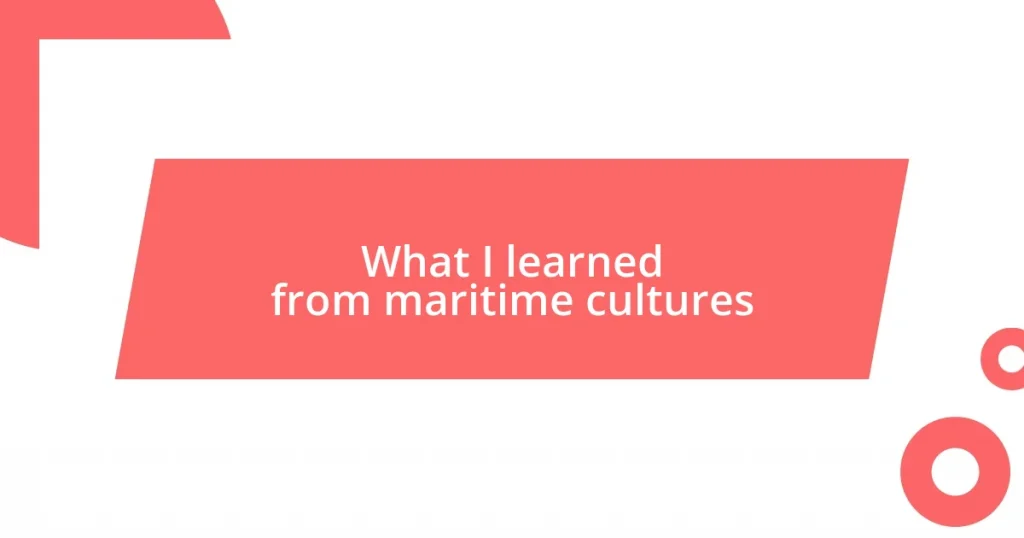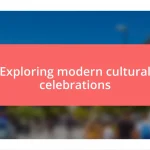Key takeaways:
- Maritime cultures thrive on deep-rooted traditions and knowledge passed down through generations, emphasizing the connection between community, spirituality, and the sea.
- Historical maritime practices have significantly contributed to cultural exchange and economic connectivity, shaping identities and fostering cooperation among diverse civilizations.
- Sustainable fishing techniques and community-led initiatives highlight the importance of respecting and preserving marine ecosystems, demonstrating that traditional methods can effectively promote environmental sustainability.
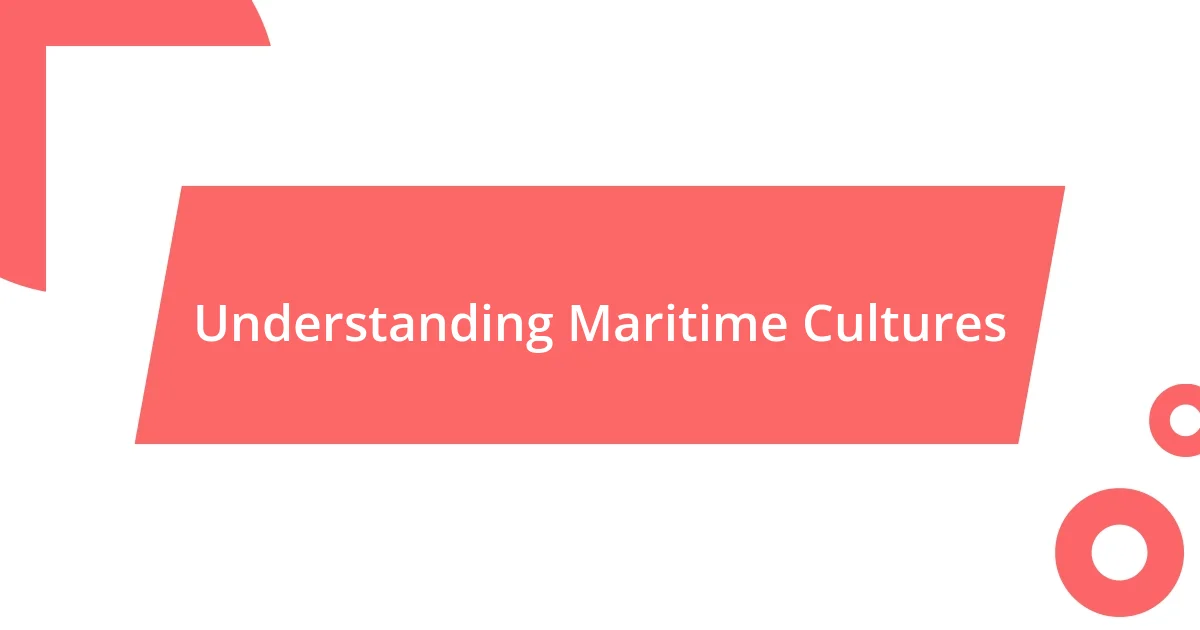
Understanding Maritime Cultures
Maritime cultures are fascinating ecosystems shaped by the rhythms of the sea and the lives it supports. I remember visiting a fishing village where the community thrived on tradition and cooperation; their understanding of the ocean was passed down through generations. Have you ever thought about how much knowledge a fisherman has to have about weather patterns, tides, and fish behavior?
Engaging with these cultures often feels like stepping into a living history book. There are countless stories etched in the behaviors, rituals, and folklore shared by seafarers. I’ll never forget the evening a local elder recounted tales of legendary voyages that taught not just skills but also respect for the unpredictable nature of the sea. Isn’t it striking how folklore can serve as a way to preserve vital information?
The deep emotional connection maritime cultures have with the ocean is palpable. It’s where they find sustenance, purpose, and identity. While sailing through rough waters, I learned that maritime communities often treat the sea as a revered teacher, one that demands humility and gratitude. Have you ever taken a moment to appreciate how the challenges of the ocean shape not just livelihoods but entire worldviews?
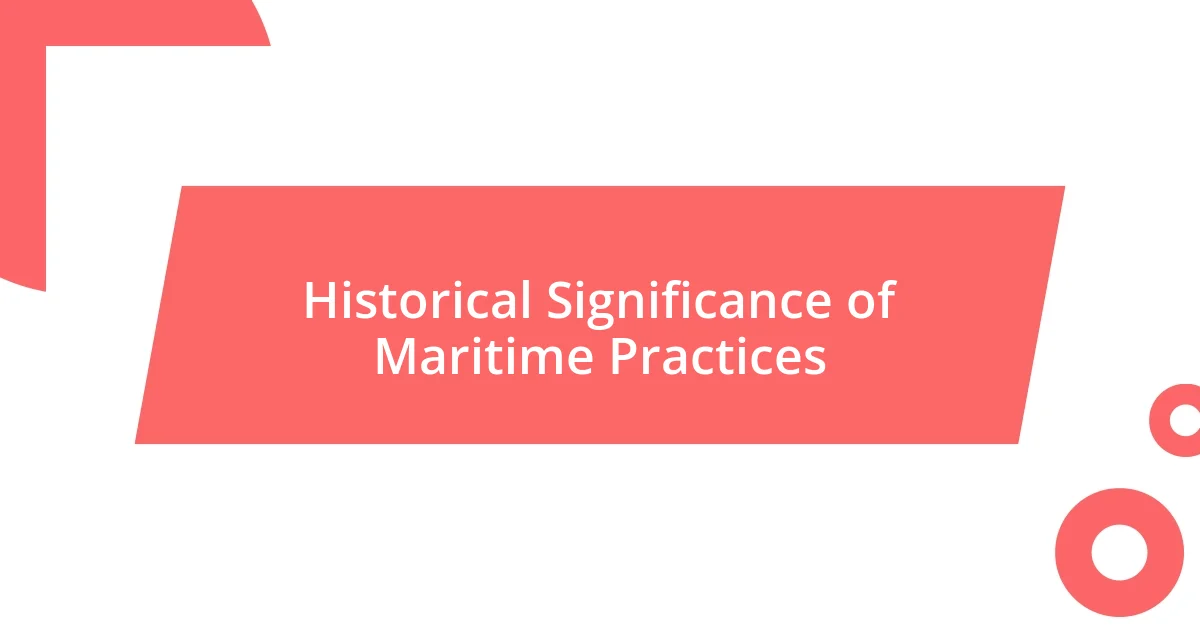
Historical Significance of Maritime Practices
The historical significance of maritime practices is immense, as they have been the backbone of trade, exploration, and cultural exchange throughout human history. When I reflect on the ancient maritime routes, I’m amazed by how they facilitated not just economic prosperity but also the mingling of diverse cultures. Imagine the scent of spices and the sound of foreign languages filling the air at bustling ports—it’s a vivid reminder of the interconnectedness fostered by seafaring.
Looking back, I often think about the great seafaring civilizations, like the Phoenicians and the Vikings. They meticulously charted the oceans, navigating treacherous waters that mirrored their adventurous spirits. During my travels through Scandinavia, I visited historic sites where Viking ships were unearthed. It was awe-inspiring to stand where skilled artisans once crafted vessels that carried not just goods but stories of bravery and exploration. What would it have been like to embark on a long voyage into the unknown?
As I delve into maritime practices, I realize they have shaped much of our cultural heritage. Songs, dances, and even culinary traditions often find their roots in the ocean’s bounty. At a coastal festival I attended, there were lively performances celebrating the sea’s gifts—shellfish caught that morning and stories of local legends shared around a warm fire. Such traditions are more than just entertainment; they echo the reverence and reliance we have on maritime life, a connection that has existed for centuries.
| Maritime Practice | Historical Significance |
|---|---|
| Ancient Navigation | Enabled exploration and trade across vast oceans, linking distant cultures. |
| Cultural Exchange | Fostered cooperation and understanding among diverse civilizations through interaction. |
| Fishing Traditions | Provided sustenance and shaped community identities and social structures. |
| Shipbuilding Skills | Demonstrated ingenuity and craftsmanship essential for maritime expansion. |
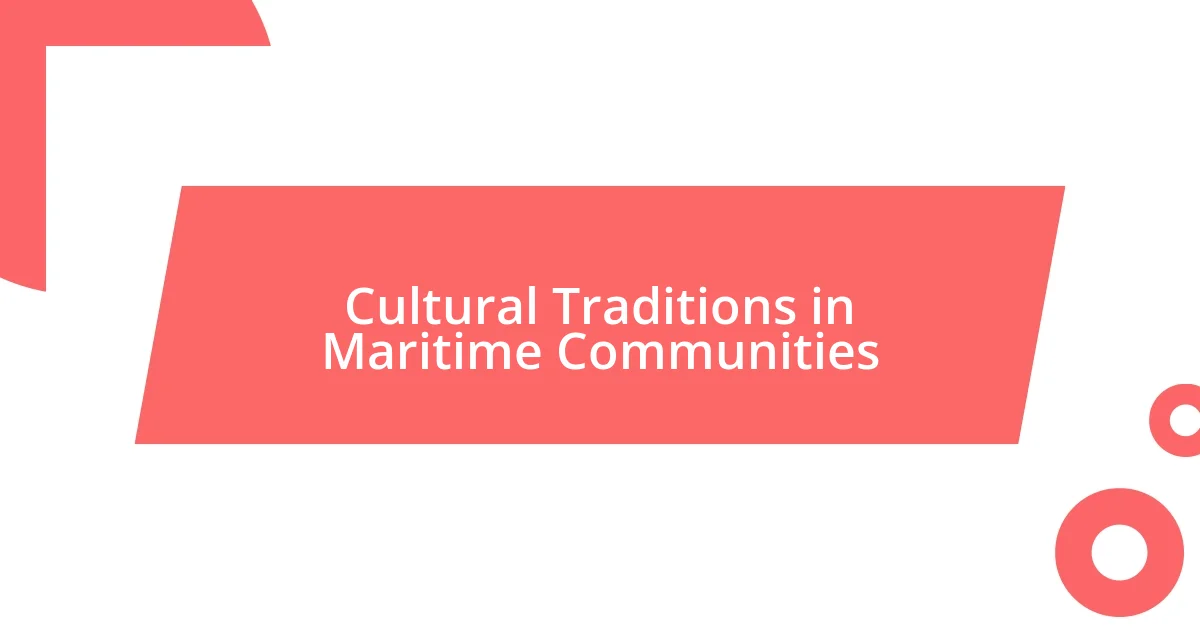
Cultural Traditions in Maritime Communities
Maritime communities are rich with cultural traditions that define their identity and connection to the sea. I remember watching a local festival where fishermen blessed their boats before heading out, a ritual filled with prayer and offerings to protect them during their journeys. It was a beautiful reminder of how intertwined spirituality is with daily life at sea. These traditions often serve as an anchor, ensuring that values and practices are passed down through generations.
Here are some key cultural traditions I’ve observed in various maritime communities:
- Boat Blessing Ceremonies: These rituals, often filled with songs and prayers, signify respect for the ocean and a plea for safe voyages.
- Fishing Festivals: Celebrations that showcase community spirit through dancing, feasting on freshly caught seafood, and storytelling about local legends.
- Oral Traditions: Elders pass down knowledge of the sea, weaving tales that teach younger generations about survival and respect for nature.
- Heritage Crafts: Techniques such as net-making and boat-building highlight the community’s ingenuity and connection to their maritime history.
During my travels, I felt a palpable sense of unity among these communities. Their traditions weren’t just customs; they encapsulated a shared history and collective wisdom that shaped their bond with the ocean. There’s something profoundly moving about witnessing how these practices keep the past alive while guiding the present.
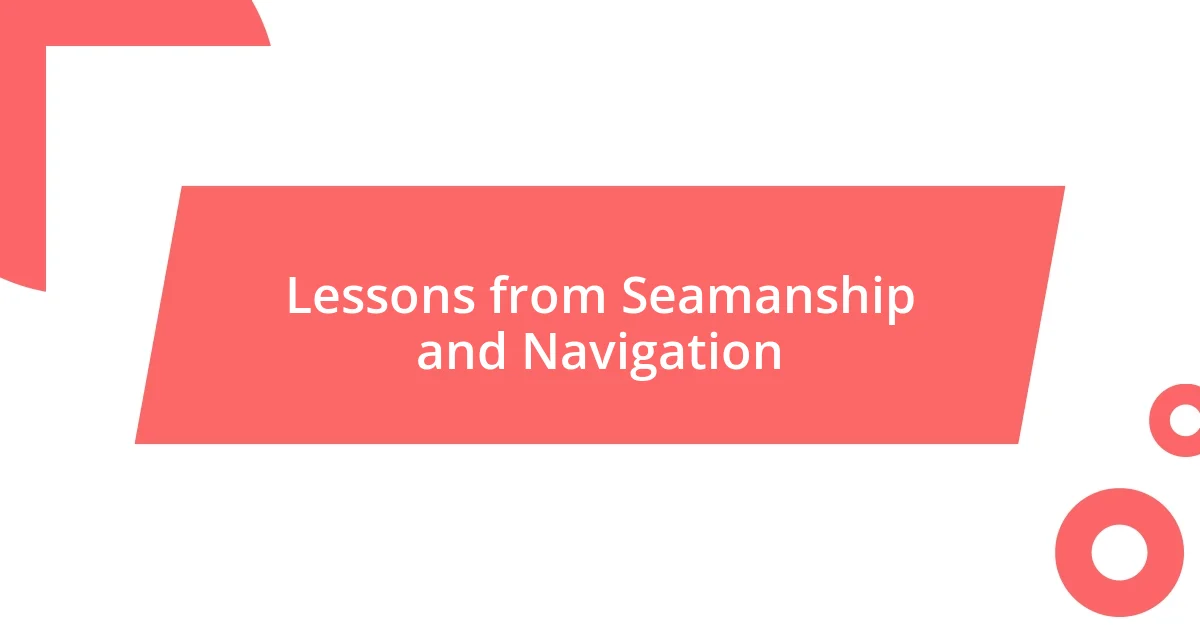
Lessons from Seamanship and Navigation
Seamanship and navigation are practically an art form, blending skill with a deep understanding of nature. I remember standing on a fishing boat, listening to an experienced captain explain how the stars guided his ancestors long before GPS. It struck me how vital this knowledge is—not just for finding one’s way but for developing a profound respect for the vastness of the sea. Have you ever gazed into the night sky and imagined the voyages that were once charted by the constellations?
The intricate dance of navigation is all about observation and intuition. For example, while sailing off the coast of Maine, I learned to read the wind and the waves, distinguishing shifts that could signal an approaching storm. That day taught me that a sailor’s life isn’t only about skill; it’s also about reading subtle signs and adapting quickly. Isn’t it fascinating how much the ocean communicates, urging us to understand its language?
Caring for a vessel connects one to a legacy of maritime craftsmanship that spans generations. I once helped restore an old wooden boat in a quaint harbor. Each plank told a story, and my fingers felt the echoes of the past with every stroke of the sandpaper. This experience opened my eyes to the steely determination behind seamanship—it’s about preserving history and celebrating the craft that has allowed us to navigate the world. What is it about working with our hands that brings us closer to our roots, especially when those hands are guided by the wisdom of the sea?
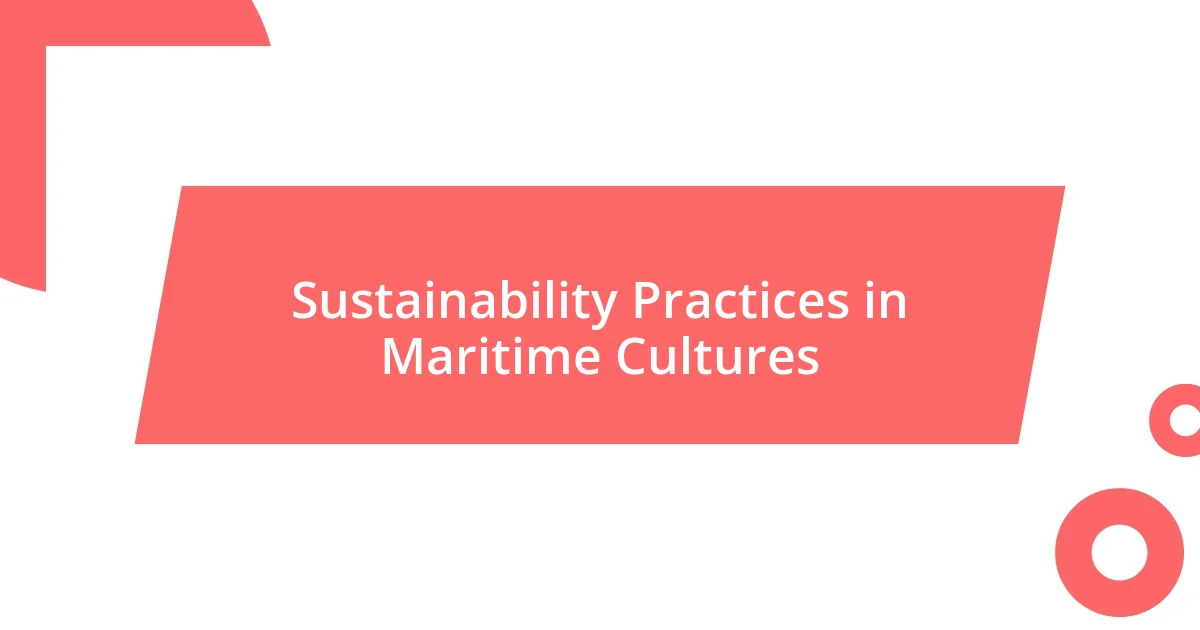
Sustainability Practices in Maritime Cultures
Sustainable practices in maritime cultures often mirror their intrinsic relationship with the ocean. I vividly recall a visit to a small coastal village where the fishermen were using traditional methods that minimized environmental impact—like fish weirs and traps. Seeing how these techniques allowed for selective harvesting made me appreciate the wisdom embedded in their practices. It’s a reminder that sustainability doesn’t always come from modern technology; sometimes, it’s about revisiting age-old traditions.
During my travels, I was fortunate enough to witness a community-led seaweed farming initiative. The entire village participated, sharing techniques passed down through generations while revitalizing the local ecosystem. Watching local kids learn how to cultivate seaweed was inspiring. It made me ponder: how can we encourage similar initiatives in other regions? It’s this hands-on involvement that promotes a deeper connection to the marine environment, fostering respect and care for nature.
One poignant memory is from a conference where indigenous leaders shared their traditional ecological knowledge. They spoke passionately about their long-standing practices that prioritize biodiversity and conservation. I was struck by their emphasis on harmony with nature—it’s not just about taking from the ocean but living in balance with it. Their words left me wondering if we, too, could embrace this mindset. After all, sustainability is as much about the future as it is about respecting the past.










